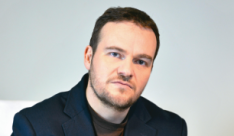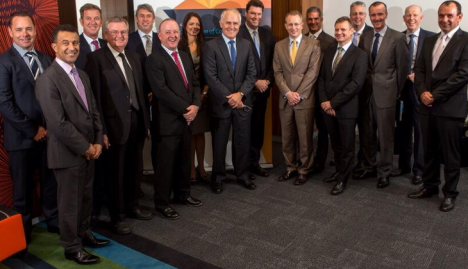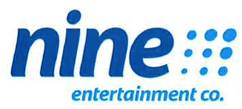The media consolidation is coming – and the deals have probably already been done
 The coming wave of media consolidation could push Ten into the arms of News Corp, Seven into bed with Fairfax Media and Nine with WIN, predicts Mumbrella’s Tim Burrowes
The coming wave of media consolidation could push Ten into the arms of News Corp, Seven into bed with Fairfax Media and Nine with WIN, predicts Mumbrella’s Tim Burrowes
A long while back, I had lunch with the father of an English Premier League footballer. He confided that his son would be replacing my club’s top striker.
None of this had appeared in the transfer-obsessed tabloid sports pages. And nor did it for several months. But the transfer eventually unfolded in exactly the way he told me it would.
It was eye-opening to realise just how far in advance top level deals are stitched up.
I’ve a hunch that a similar process has been occurring in relation to Australian media ownership. The landscape is about to see some radical change. And I suspect that hands have already been shaken on many of the deals.
It’s starting to seem likely that communications minister Malcolm Turnbull will do away with the key rules around media ownership, covering the percentage of the population any individual TV network can reach, and the rule that in any given city, media owners can hold no more than two out of three of newspapers, TV stations and radio stations. Instead, it will be a simpler test from the Australian Competition and Consumer Commission on whether a deal reduces competition.
The signals from Turnbull and PM Tony Abbott got louder over the weekend.
Several people in this picture of the media bosses’ summit tweeted by Turnbull on Friday may well be colleagues before the year is out
So let’s speculate on where the consolidation will happen. And yes, this is all speculation.
1. News Corp buys Network Ten. (And maybe Nova)
Why does this makes sense?
First, the people and the history.
Ten’s chairman is Lachlan Murdoch, who also owns about 9% of the broadcaster.
He is, as most readers will be aware, the son of News Corp’s executive chairman Rupert Murdoch and is himself on the board of News Corp.
Ten’s CEO is Hamish McLennan, who moved into the job after the firing of James Warburton. McLennan previously worked directly for Rupert Murdoch in New York in the role of executive vice president of the Office of the Chairman.
Ten is a solid customer of News Corp’s sibling 21st Century Fox (the chairman and CEO is Rupert Murdoch, and Lachlan Murdoch is also on the board of this company too.)
Among 21st Century Fox’s assets airing on Ten are The Simpsons plus the output of Shine Australia including Masterchef, The Biggest Loser, The Bachelor and So You Think You Can Dance.
Speaking of Shine, a habit begins to emerge when it comes to Rupert Murdoch’s children and their businesses.
Back in 1995, Paul Barry reports in his book Breaking News, James Murdoch worked with friends on hip hop record label Rawkus Records. According to Barry, News Corp bought a half share for $20m, bringing James back into the family business.
Then there’s Shine, the extremely successful TV production house created by Elisabeth Murdoch. She was brought back into the family business when News Corp bought Shine for a reported $675m in 2011.
So Murdoch conspiracists would certainly be able to point to the purchase of Ten as a means for Rupert Murdoch to bring Lachlan back into the fold – if Lachlan is willing to allow that to happen.
Some sensible heads within News Corp point out that if Lachlan wanted to return then it wouldn’t need to be on the back of a complex media deal. More important would be whether he wanted to – he suddenly left the organisation in 2005 over what has since been characterised as losing a power battle with US TV execs. He reportedly told his father that he needed to “be my own man”.
So a question could be whether he feels he has achieved that.
And while Ten is currently a ratings mess, the picture is more complex that Lachlan Murdoch’s critics draw. His radio company (recently rebranded from DMG to Nova Entertainment) is unquestionably a success. Nova can claim to be the top ratings national commercial network and its second network smoothfm is also doing well. (The only woman in the picture above is Cathy O’Connor, CEO of Nova Entertainment.)
There’s more history too. Rupert Murdoch was behind the creation of the Ten Network as it is today. He had to sell in the mid 1980s when he became a US citizen.
Should a deal happen which saw Ten become part of News Corp, it would also help answer a question which has been hanging since last year.
When Kim Williams was axed as CEO of News Corp Australia, his replacement was the previously retired Julian Clarke. It felt like a caretaker appointment. With the exception of Hamish McLennan, or indeed Lachlan Murdoch himself, no obvious successor for Clarke has emerged since.
Other clues come from the News Corp newspapers themselves. You wouldn’t, for example, know just how badly Ten has been performing based on the coverage in The Australian and the tabloids (last week was one of its worst for ratings share in its history). They’ve been supportive of Ten, to say the least.
And just as intriguing has been the treatment of former Murdoch family rival James Packer. The papers have been very positive about his Barangaroo Sydney casino proposals. Packer left the Ten board over Murdoch’s poaching from Seven of James Warburton. But he still has a stake of about 9% that he’d need to agree to sell. It’s helpful that News Corp have been so good to him recently.
If it does happen – and personally I now think it more likely than not – it will raise a couple more questions.
What of Nova Entertainment? That would depend on the new ownership rules of course. I’m sure News Corp would want it to become part of the stable too. But given the relatively small revenues of radio compared to TV, it might be treated as a battle not worth dying in a ditch for.
And how about News Corp’s half share (with Telstra) in Foxtel? You could make an argument that a merged sales operation (as has already been speculated upon) between Foxtel’s sales house MCN and ten could actually create more competition in the TV market because it would create a third giant to stand up to Seven and Nine.
But would the ownership of Foxtel change? Telstra’s probably not a seller. So would News sell to Telstra at the right price, particularly if it was back in the free-to-air game? That one’s a big call given that 21st century Fox has pay TV investments in other parts of the world, even if there is speculation that it could sell down its BSkyB stake in the UK, pssibly to Vodafone.
2. Seven West Media buys Fairfax Media (And Prime)
I’m not the first one to call this. Credit goes to former ACP boss Colin Morrison, who blogged about the possibility earlier this year.
The fit would be a good one. Putting The West Australian (which remains profitable) into the same newspaper family as The Age, The Sydney Morning Herald and the Australian Financial Review makes sense. So does sharing news gathering for Fairfax’s network of talk radio stations including 3AW in Melbourne and 2UE in Sydney with Seven News. Suddenly Yahoo!7 would have much more of an offering.
Morrison argues:
“Many Australian media observers expect a change in the ownership of Fairfax. And who better to co-operate with the feisty [Fairfax shareholder] Gina Rinehart than fellow Perth billionaire Kerry Stokes? The possibility gains traction with Seven West’s newest non-executive director who was formerly CEO of PBL and a director of Fairfax. A Seven West-Fairfax combination could become a formidable multimedia player on the domestic and global stage.”
There’s a little more to fuel this. Fairfax boss Greg Hywood has urged changes in the ownership laws.
And there was a fascinating paragraph in this weekend’s lengthy piece in the AFR on the Fairfax turnaround story.
Having clearly spent some time with Fairfax CEO Greg Hywood, the authors James Chessell and Jake Mitchell wrote: “Amid the change brought about by an increasingly digital world, relationships will be critical for traditional media companies. News Corp’s mastheads have strong links with not just Foxtel but Ten Network Holdings, whose chairman is Lachlan Murdoch. Fairfax has made no secret of the fact it would be willing to join forces with the right partner. With much of the hard work done, Hywood, along with other media bosses and Minister for Communications, Malcolm Turnbull, is pushing for ownership laws to be relaxed. ” As I read it, I couldn’t help think that I was seeing Hywood’s own thinking leaking through.
Then there’s Prime, whose regional NSW, Victorian and ACT stations are already Seven affiliates. Once the population reach rules change, it seems an obvious move, given that Seven already has a stake.
The only slightly weird thing in recent days has been the sudden exit by Prime shareholder Paul Ramsay. There seems to not have yet been an obvious explanation for why he would exit now, just before the ownership rules change which would inevitably have made his shares more valuable.
Again it feels like an unannounced deal might already have been in place.
3. Nine buys WIN
 In many ways, this is the most obvious of the lot. WIN recently sold its metro stations in Perth and Adelaide to Nine.
In many ways, this is the most obvious of the lot. WIN recently sold its metro stations in Perth and Adelaide to Nine.
Already, there are signs that the direct ownership is making the network more competitive with Seven in the two states.
There are indications that the networks are beginning to shift from a metro audience sales message to a national one. Increasingly, it would be strategically sensible for the big three networks (or at the very least Seven and Nine) to directly own the regional stations too.
Last year, the possibility emerged that Nine could buy or merge with Southern Cross Media Group’s TV assets. But this faded when the Labor government fell without changing the ownership laws.
In June, Southern Cross re-signed affiliation agreements with Ten for a further three years, which also makes any imminent deal seem less of a goer.
All of this is of course speculation. But a handful of people already know what’s probably going to happen. Now we’ve just got to wait for them to tell us.
Tim Burrowes is content director of Mumbrella






 Linkedin
Linkedin
All very interesting. Additional context to #2 – stories were SWM was going to buy a stake in Domain not that long ago. If SWM buy FXJ then they could dissolve their digital partnership with Yahoo too.
User ID not verified.
Anyone who media consolidation is all in the name of “free media” or “free market” is kidding themselves. This, if anything, will make it harder for smaller players to establish themselves in the media landscape. It will become more the plaything of billionaires than it already is.
I really hope there are some visionaries out there who figure out and pursue an online only business model across print, video and audio – and who do not sell their stakes to the established media giants.
User ID not verified.
As if Murdoch didn’t absolutely dominate Australia’s public debate now with his 65% of metropolitan daily print circulation! And the catastrophic effect this has had on Australia’s democratic processes, with all important issues being passed through the Murdoch self-interest filter before reaching the public debate.
I guess we could stand to save a lot on electoral costs. Simply scrap the election and send the two candidates over to Rupert’s court in NY, and let him choose. Scrap the middle-man, the Australian electorate.
User ID not verified.
all bad news for us working in the industry and the population at large.
User ID not verified.
I saw some senior ch7 staff at Fairfax back in early 2013.
User ID not verified.
The News/Ten deal is as good as done, you forgot to mention that the sales team will be merging with MCN (they have just cleared half of their sales floor).
Not good for journalism or “Free Press”
it also makes crystal clear why the bolt report is still on Ten despite being a commercial and ratings failure and alienating Ten’s core audience.
Oligarch indeed…
User ID not verified.
More likely that TEN would purchase WIN (given Bruce Gordon’s stake in TEN) and Nine would purchase Southern Cross. Most importantly it would be a great way to get more Australian content into regional markets if they allowed other players to access capacity. It’s not so much about relaxing the rules but about encouraging new players. Perhaps community television (the quality community channels like the one of Foxtel) can pick up the slack of local content.
User ID not verified.
Rupert might well fit up Lachlan with a nice new empire. But IMO that would not be a great place to be if you’re a shareholder. It’s possible that a consumer recovery would buoy up ads, but those print businesses look to be crook. And then there’s TEN.Doubt that Nine would want to bulk up, but they – or Seven – might do well to get into content via a company like Freemantle. As for Fairfax, it’s hard to see how they present value. The big assets and brands are unwell – even the AFR appears to be trading poorly – the regionals are showing serious signs of stress and the radio acquisition is looking like an albatross. Doman is not the independent entity it’s being touted as.In fact I think Hywood is a bit desperate for a deal to bale out before his spinning plates wooble too far.
I want to see Netflix et al loose in this market. Then we can really see what’s what.
User ID not verified.
@ Media Buyer
As I understand it the ‘new improved’ Bolt Report is entirely funded by News Corp (host, production…everything) yet broadcast on Channel 10.
Surely the News Corp / Channel 10 nexus must be sailing very close to the wind with the current cross-media ownership laws? With Lachlan’s dual positions in either organisation and the close co-operation on resources.
No wonder Malcolm feels a need to ‘reform’ our cross-media ownership laws. No prizes for guessing who will be the major beneficiary from this. Hint…it’s not Australia’s democracy.
User ID not verified.
TEN will become FOX
User ID not verified.
The Ten News deal is done & was one of Abbott’s costs of admission. Be interesting to see how Malcolm rationalises it.
Not a good time to live in this country.
User ID not verified.
If News are going to buy Ten then it might be a good time to buy Ten shares … they are now around 30c but when LM got involved they were at $1.50+
There’s no way News buying Ten at or even remotely close to the current share price would be allowed – it would need to be close to the value it was when LM got involved otherwise it would raise a lot of questions. Ten could be a decent speculative buy at 30c to see if a takeover eventuated and if so, at what price. Could be a chance to get 2-4x with no real risk.
User ID not verified.
I thought I read all this in Margaret Gee’s media guide? Sorry did I just regress back to 1983? The more things change…
User ID not verified.
So Tim,
By giving us your EPL anecdote are you saying you are “in the know” as transfer deadline day twitterati put it, or are you just speculating?
I’m suspecting/hoping for the latter. Suspecting because I can’t see why a sane person would want to buy any of those businesses (mitigated but Rupert having a history of being willing to lose money if it gives him more power) – and hoping because if they do that’s a black day for Australia.
User ID not verified.
Brilliantly put, Bob Smith.
User ID not verified.
Hi Hugo, as I mentioned in the piece – 100 % speculation on my part.
Cheers,
Tim – Mumbrella
I do think it’s funny that no one is batting an eyelid about the Seven + Fairfax. Surely that’s the one people should be worried about.
User ID not verified.
Good article Tim, depressing as the prospects are of even more media consolidation in Australia. I can just see all those glowing reviews of shows across media owned by the same parties and politicians ever more compliant to the media bosses’ self interest. But as for Ten. Is Rupert going to put a fatherly arm around the shoulder of his son Lachlan and tell him he is just not cut out for television, sack all his appointed executives and keep him as far away as possible to rebuild Ten? And are those other major shareholders such as Gina, James et al going to swallow their huge losses or hang in for the rebuild which may never come? If everything you postulate happens Tim then once the government emasculates ABC funding the circle will be complete.
User ID not verified.
But what about the New Zealand arm of Fairfax?
User ID not verified.
Meanwhile Google will keep eating everyone’s lunch whilst the traditional media sector keep feeding on themselves like fat (yet ever shrinking) grubs.
User ID not verified.
And what does it all mean for us the news readers Tim?! Please tell us more… it doesn’t sound good but I’d love if you can spell it out for us.
User ID not verified.